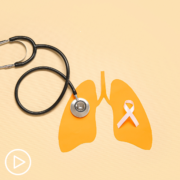When Can Small Cell Lung Cancer Patients Use Palliative Care?
When Can Small Cell Lung Cancer Patients Use Palliative Care? from Patient Empowerment Network on Vimeo.
When might small cell lung cancer patients want to use palliative care? Expert Beth Sandy from Abramson Cancer Center defines palliative care and shares examples of palliative care support.
[ACT]IVATION TIP
“…there’s even data to show in lung cancer that patients who see palliative care in addition to their primary oncologist actually live longer and have improved quality of life. So we will often pair up with the palliative care team to help our patients maximize their symptom support and their side effect support, and have a good understanding of what their goals of care are with the treatment so that everyone’s on the same page and everyone is having a good experience.”
See More from [ACT]IVATED Small Cell Lung Cancer (SCLC)
Related Resources:

How Can Small Cell Lung Cancer Patients Ask About Care Goals |

|
Transcript:
Lisa Hatfield:
Palliative care is important for quality of life during small cell lung cancer treatment. Can you, first of all, explain what palliative care is, and then also give some advice, any advice you have for patients and their families on including palliative care early on in their course?
Beth Sandy:
So first, let’s define what palliative care is. It seems to be a big word, and sometimes people get a little concerned or confused when they hear that and they think, “Oh, does this mean I’m at the end or something like that?” And it absolutely does not. So palliative care means helping with supportive care or treatment of your side effects or symptoms. So we have a whole different set of doctors and nurse practitioners at my institution who just focus on the palliative care needs.
So, for example, if I have a patient with lung cancer, that’s what I treat, or maybe small cell lung cancer, but if I have a patient with lung cancer who is having a lot of pain and in my visit, I know the basics of the opioids and other medications, but usually we’ll send those patients to palliative care because they will have some other ideas and they can really focus and spend a half-hour just talking about those symptoms, like the pain, the cough, the shortness of breath, the weight loss.
So some people call it palliative care service, other people call it a supportive care service. That’s another kind of term for it. What the palliative care teams often do is what’s called the goals of care discussion, and that can mean a lot of different things to patients. What are your goals with life in general? Not even related to your cancer. Learning about you. Like who do you live with? Who is dependent on you? Who are you dependent on? And then going from there, and what is your understanding of your cancer and what are your goals with the treatment?
Sometimes we use a term called trade-offs. We would say, if the cancer, we’re treating it and it’s worsening, and then we have another treatment for it, and those side effects may be a little bit harder, is that something you want to risk, is being in the hospital and maybe being sick over the holidays or something, or would you prefer not to do that?
So palliative care often helps us with these goals of care discussions, and that can even lead to discussions about do I want CPR and resuscitation and things like that? Some people from the very start of their cancer, even if it’s a curable cancer, say, “But I’m at the point in my life where I have all these other illnesses, and I don’t want to be resuscitated. I want a natural death.” So those are all things that palliative care oftentimes can help with, living wills and things like that. And it’s not to say that your oncologist can’t because these are things I can do as well. But if I’m in a visit with you and I wanted to focus really on the current chemotherapy you’re on and those side effects, it may be better to have a palliative care doctor come on who is trained more in having those discussions.
And I wanted to make one distinction. Is that palliative care is absolutely not hospice care. So hospice care is when we’ve decided we do not want to do any more treatment for the cancer, and we want to improve the quality of the time that we have left. That’s hospice care. Palliative care is not that. Palliative care is when you are still on treatment, and we just want to maximize the supportive care and talk about what your goals are of the treatment. So I think my activation tip here for palliative care is that we often use it in lung cancer.
There’s even a study, there’s even data to show in lung cancer that patients who see palliative care in addition to their primary oncologist actually live longer and have improved quality of life. So we will often pair up with the palliative care team to help our patients maximize their symptom support and their side effect support, and have a good understanding of what their goals of care are with the treatment so that everyone’s on the same page and everyone is having a good experience.
Share Your Feedback:
Create your own user feedback survey




